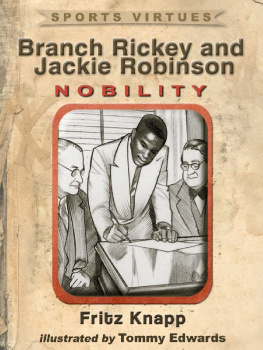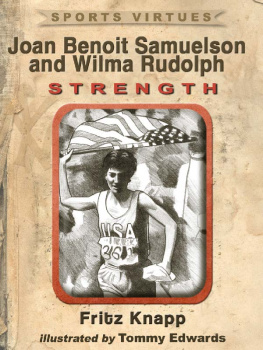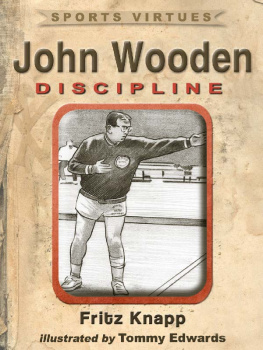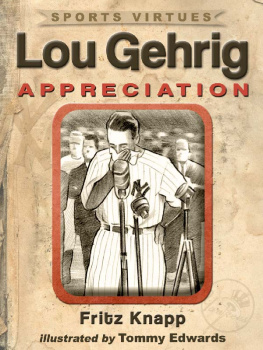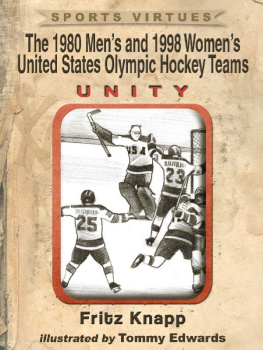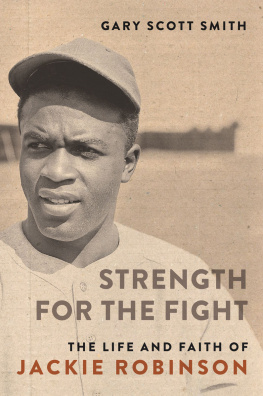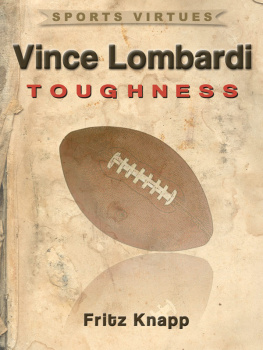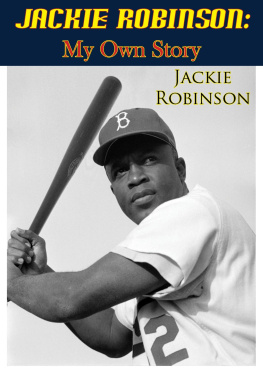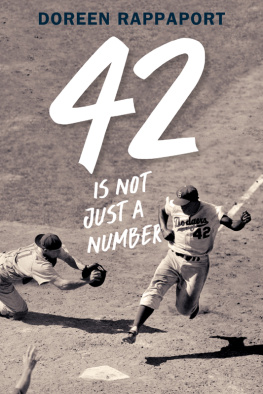Price World Publishing
www.PriceWorldPublishing.com
Scripture quotations are from the New Revised Standard Version Bible, copyright 1989 by the Division of Christian Education of the National Council of the Churches of Christ in the USA. Used by permission.
Copyright 2012 by Fritz Knapp
All rights reserved. Neither this book, nor any parts within it may be sold or reproduced in any form without permission.
Illustrations by Tom Edwards
Edited by Michael Wilt
eISBN: 9781619840416
Introduction
Their nicknames often seem to point to triumph: The Iron Horse, Captain Clutch, The Dominator, Mr. October, The Rocket, The Sultan of Swat, Air Jordan, Dr. J. But the true stories of many sports stars are much like those of any other human being. We all must, at some time or another, work and strive to overcome trouble, problems and hardship. Most of us do so on a smaller stageno lights, cameras, announcers, or postgame interviews. But there is much we can learn about how to live our own lives by studying the stories of great athletes who have overcome hard times and adversity.
The main characters in this series are well-known athletes and sports figures, men and women who have overcome personal misfortune through strength of character. Their stories inspire greatness in others. About ten years ago, I began to study athletes and the qualities that made them great. I was interested in more than their athletic abilities, impressive as those are in individuals who have made it to the top of their games. I was especially interested in their life abilities, the way they dealt with the variety of setbacks and struggles that all human beings encounter. In my study I read sports biographies by the dozens, and not just those of the most recent superstars. My reading took me as far back as the late 1800s. I found truly captivating accounts of athletes whose attitudes in their weak moments gave them more enduring legacies than they ever would have earned in athletic competition alone. As I entered some difficult personal times, these athletes became my friends and gave me a sense of hope that the struggles in my life would ultimately make me a stronger person.
I can personally identify with each athlete in this series. There is a part of me in every one of their stories. I have battled fatigue, failure and depression like U.S. Open golf champion Ken Venturi. I have had speech difficulties and low confidence like Amos Alonzo Stagg. My body has failed me at different times, as Gertrude Ederles and Lou Gehrigs bodies failed them. Despite lifes downside, though, I have been blessed with a source of strength that comes from deep within my soul and is a well-spring of incredible peace. This well has been fed, in part, by knowing otherssome personally and some through their storieswho fought hard to overcome their difficulties. My spirit has risen in the midst of trials, like an eagle in a storm soaring high above the mountains. But it is the Spirit that can turn tragedy into triumph, despair into hope, and defeat into victory. While the crises of life rage, Gods abundant grace is most present.
Each story in this series identifies a key personality trait demonstrated by a great athlete or sports figure in his or her struggle against adversity. Here you will read, for example, of the compassion of Gale Sayers and Brian Piccolo; the integrity of Arthur Ashe; the persistence of Althea Gibson; the wisdom of Happy Chandler. Through these and other stories, I hope you will find inspiration and a few new friends to help you along lifes journey. Get to know these people and you too will hear the lessons they teach. Let them be your mentors. Bring to your life the virtues described in these stories, and bring your own story into clearer perspective. Be true to who God made youa shining star in a dimming world. As St. Paul wrote, Adversity produces character, and character produces hope, and hope will not disappoint. Let adversity help turn you into the successful person God has created you to bea person of hope, a person of character.
NOBILITY
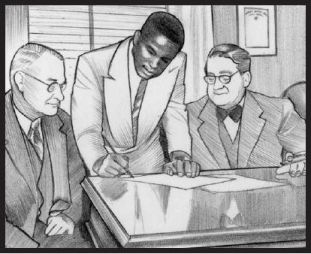
Branch Rickey and Jackie Robinson
| NOBILITY: The state or quality of being exalted in character. |
No greater act of nobility can rival that of one person putting him- or herself at risk for the sake of another. Such nobility is seen in Branch Rickey, the Brooklyn Dodgers general manager, and Jackie Robinson, the star Dodger player, and is exemplified in the actions they took and the manner in which they carried themselves in 1947. That was the year that these men shocked the world by breaking Major League Baseballs color barrier.

The end of World War II in 1945 saw a post-war euphoria through-out the United States as it rose to the level of world super power. Part of this rise included encouraging healing and reconstruction in Europe, even as racial divisiveness raged in America. The signs of separation were everywhere, from the military to the countrys beloved pastime, baseball. At that time, there were two distinct leagues: the entirely white major leagues and the all-black Negro League. This segregation dated back at least as far as the 1890s, when white baseball executives established an unwritten rule barring blacks from the major leagues. The exclusion of black players had nothing to do with talent. It had everything to do with a handful of powerful men whose racial prejudices and fears kept them from dealing fairly with black players. With this backdrop, Branch Rickey, general manager of the Brooklyn Dodgers, and Jackie Robinson, an outstanding Negro League ballplayer, met in 1945.
Wesley Branch Rickey was born in 1881 to an Ohio farming family of modest income and strong Protestant religious beliefs. Although Branch and his brother played football and baseball every day, Sunday was reserved for church and rest. Playing games such as baseball and football became primary entertainment for the active Rickey boys, and one could find them tossing a ball any day of the week, except Sunday. As a youngster, Branch promised his mother that he always would observe the Sabbath.
After earning the equivalent of a high school diploma, Rickey was accepted at Ohio Wesleyan University. He worked doggedly on his studies to compensate for the lack of preparation and held down many diferent jobs to pay his tuition. Despite this schedule, he still made time for athletics, which provided an outlet for his vast energies. At the time, collegians such as Rickey were allowed to play in football and baseball semi-professional leagues for pay. Almost more than the actual game, Rickey thrived on the strategy involved in competition. He often wrote down the way that opposing pitchers pitched and other nuances of the game in a little black notebook. He could later consult his notes in order to improve his teams chances of winning the next time they faced that team. He took an intelligent approach to these otherwise raucous and loosely organized sports. Later in his storied career, Rickeys little black notebook would become famous to friends and opponents alike.
In 1902, Branch Rickey focused all of his athletic eforts on baseball. He rose through the semi-professional ranks as a catcher on several minor league teams. In 1903, he was promoted to the Cincinnati Reds, the team he loved most as a youth. But Branch Rickeys stay with the Reds was short, playing only one game on a Saturday afternoon. After the game, the manager told Rickey to report to the field the next day. (Sunday was the most profitable day of the week for baseball teams.) Rickey explained that he could not come to the field because of his religious convictions and the promise he had made to his mother. The coach immediately dismissed Rickey from the team in a humiliating fashion.
Next page
